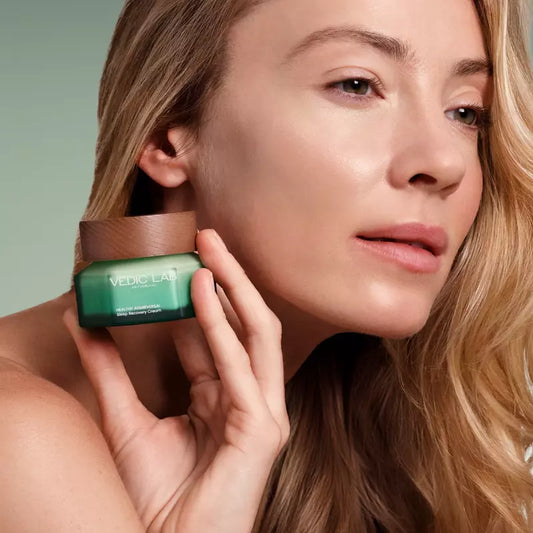About The Products
Understanding your skin type is essential when selecting the right skincare products. At VEDIC LAB, we believe in the power of combining the ancient wisdom of Ayurveda with modern science. Ayurvedic ingredients are not just time-tested remedies; they are scientifically proven to benefit your skin, providing nourishment, balance, and protection. Whether you have dry, oily, combination, or sensitive skin, this approach allows you to harness the power of nature in a way that suits your skin’s unique needs.

Understanding your skin type is essential when selecting the right skincare products.
Understanding Your Skin Type
Skin types can generally be categorized into four groups:
Dry Skin: Lacks moisture, often leading to flakiness, rough texture, and tightness.
Oily Skin: Produces excess sebum, resulting in shine, enlarged pores, and breakouts.
Combination Skin: A mix of both oily and dry areas, typically with an oily T-zone and dry cheeks.
Sensitive Skin: Reacts easily to external factors, causing redness, irritation, and imbalance.
Once you know your skin type, the next step is selecting products that restore balance, enhance hydration, and improve overall skin health.
Best Products for Dry Skin
Dry skin often lacks moisture and natural oils, which Ayurveda links to an imbalance in the Vata dosha. Ingredients that deeply nourish and protect the skin are crucial.
Almond Oil, rich in Vitamin E, provides deep hydration, softening dry, rough patches while protecting the skin from environmental damage. Science backs this up: almond oil has been shown to improve skin’s moisture levels and elasticity.
Together, these Ayurvedic ingredients deliver lasting hydration, replenishing the skin barrier and improving the texture of dry skin.

Best Products for Oily Skin
Oily skin, associated with an overactive Pitta dosha, often produces excess sebum. Ayurveda offers balancing herbs that purify and control oil production, while science explains how these ingredients work on a deeper level.
Neem, prized in Ayurveda for its antibacterial, helps reduce sebum, unclogs pores, and keeps breakouts at bay. Scientific studies confirm that neem is effective in controlling acne and oil production, making it ideal for oily skin.
Tea Tree Oil offers natural astringent properties, regulating oil without stripping the skin’s natural moisture. Known for its antimicrobial effects, tea tree oil reduces imbalance and keeps the skin clear, as confirmed by dermatological research.
These ingredients not only balance oil production but also protect the skin from environmental impurities.
Best Products for Combination Skin
Combination skin can be tricky to manage, with dry areas needing hydration and oily zones requiring balance. Ayurveda offers a blend of nourishing and calming ingredients to bring harmony to both.
Aloe Vera is known for its hydrating and cooling effects, making it perfect for addressing the dryness in combination skin while soothing the oil-prone areas. Scientifically, aloe vera has been shown to boost moisture retention without clogging pores, balancing combination skin effectively.
Turmeric, another Ayurvedic powerhouse, reduces imbalance and brightens the skin, addressing uneven tone and texture. Research supports turmeric’s antioxidant properties, helping improve skin clarity and radiance while calming any irritation.
This holistic approach allows combination skin to find balance, ensuring hydration in dry areas and control in oily zones.

Best Products for Sensitive Skin
Sensitive skin is prone to discomfort and irritation, often linked to an imbalance in the Kapha dosha. Ayurveda focuses on calming and protecting sensitive skin with gentle yet effective ingredients.
Gotu Kola is a well-known Ayurvedic herb that promotes regeneration and reduces imbalance, making it perfect for sensitive skin. Scientific studies have shown that Gotu Kola helps repair the skin barrier and improves elasticity, making it an excellent choice for irritated or compromised skin.
Sandalwood is cooling and soothing, protecting sensitive skin from environmental aggressors. It helps calm redness and irritation, and research supports its ability to improve skin texture while protecting it from pollutants.
Using these ingredients ensures that sensitive skin stays calm, balanced, and protected from external stressors.
For a skincare solution that caters to all skin types, VEDIC LAB’s Sleep Recovery Cream is the perfect choice. This cream combines powerful Ayurvedic ingredients with modern scientific research, making it suitable for dry, oily, combination, and sensitive skin.
Enriched with nourishing Almond Milk and rejuvenating Ayurvedic herbs, it deeply hydrates the skin while reducing the appearance of wrinkles. Gentle yet effective, it works overnight to restore your skin’s natural radiance, helping to strengthen the skin barrier and improve elasticity. The cream’s formula not only hydrates but also combats signs of aging, providing a smoother, more youthful complexion with regular use.
Whether your skin needs hydration, balance, or protection, VEDIC LAB’s Sleep Recovery Cream offers a holistic solution for maintaining healthy, glowing skin.
In conclusion, understanding your skin type is the key to an effective skincare routine. At VEDIC LAB, we believe in the synergy of Ayurvedic wisdom and modern science to address the unique needs of your skin. Whether you have dry, oily, combination, or sensitive skin, finding the right balance between natural care and scientifically proven ingredients can make all the difference. By using Ayurvedic ingredients like, Neem, and Gotu Kola, you can benefit from nourishing, protective, and soothing properties that restore balance to your skin. This ensures that your skin is not only well-cared for but also strengthened and protected for the long term.















